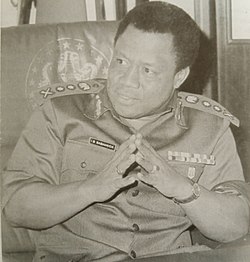Ibrahim Babangida Quote
The reason is that till date, in spite of advances in information technology and strategies of information, the written word in the form of books still remains one of humanity's most enduring legacies.
Ibrahim Babangida
The reason is that till date, in spite of advances in information technology and strategies of information, the written word in the form of books still remains one of humanity's most enduring legacies.
Tags:
technology
Related Quotes
Certainly we can say that the pace of modern life, increased and supported by our technology in general and our personal electronics in particular, has resulted in a short attention span and an addict...
Arthur Rosenfeld
Tags:
being, complicated, critical thinking, daoism, emotion, feeling, hectic, life, meditation, modern life
About Ibrahim Babangida
Ibrahim Badamasi Babangida (born 17 August 1941) is a Nigerian statesman and military dictator who ruled as military president of Nigeria from 1985 when he orchestrated a coup d'état against his military and political arch-rival Muhammadu Buhari, until his resignation in 1993 as a result of the crisis of the Third Republic.
He rose through the ranks of the Nigerian Army fighting in the Nigerian Civil War and at various times being involved in almost all the military coups in Nigeria, before advancing to the rank of a General and ultimately as Commander-in-Chief of the Armed Forces; and as an unelected President and military dictator from 1985 to 1993, ruling for an uninterrupted period of eight years. His years in power, colloquially known as the Babangida Era, are considered one of the most controversial in Nigerian political and military history, being characterized by a burgeoning political culture of corruption in Nigeria, with Babangida and his regime estimated to have misappropriated at least 12 billion dollars (23.9 billion today).
The Babangida regime oversaw the establishment of a state security apparatus; survived two coup d'ètat attempts and the subsequent execution of Mamman Vatsa (1985) and Gideon Orkar (1990) alongside the trial of hundreds of soldiers. The Babangida era also witnessed the assassination in Lagos of a prominent journalist named Dele Giwa (1986). The regime also faced a series of ethnic and religious outbreaks related to the fallout of Babangida's decision to increase cooperation with the Muslim world and rise in extremist tendencies. On the continent, his rule projected the country as a regional power with diplomatic successes including the Abuja Treaty and the military engagement of Nigerian troops in Liberia and Sierra Leone.
Abroad, Babangida's military regime cemented traditional relations with the English-speaking world of the United States and the United Kingdom; and implemented economic liberalization and the privatization of state-owned enterprises alongside a national mass mobilization. The fall of Babangida and his regime was precipitated by the transition toward the Third Nigerian Republic and the subsequent militarization of politics in the 1993 presidential election which he annulled.
He rose through the ranks of the Nigerian Army fighting in the Nigerian Civil War and at various times being involved in almost all the military coups in Nigeria, before advancing to the rank of a General and ultimately as Commander-in-Chief of the Armed Forces; and as an unelected President and military dictator from 1985 to 1993, ruling for an uninterrupted period of eight years. His years in power, colloquially known as the Babangida Era, are considered one of the most controversial in Nigerian political and military history, being characterized by a burgeoning political culture of corruption in Nigeria, with Babangida and his regime estimated to have misappropriated at least 12 billion dollars (23.9 billion today).
The Babangida regime oversaw the establishment of a state security apparatus; survived two coup d'ètat attempts and the subsequent execution of Mamman Vatsa (1985) and Gideon Orkar (1990) alongside the trial of hundreds of soldiers. The Babangida era also witnessed the assassination in Lagos of a prominent journalist named Dele Giwa (1986). The regime also faced a series of ethnic and religious outbreaks related to the fallout of Babangida's decision to increase cooperation with the Muslim world and rise in extremist tendencies. On the continent, his rule projected the country as a regional power with diplomatic successes including the Abuja Treaty and the military engagement of Nigerian troops in Liberia and Sierra Leone.
Abroad, Babangida's military regime cemented traditional relations with the English-speaking world of the United States and the United Kingdom; and implemented economic liberalization and the privatization of state-owned enterprises alongside a national mass mobilization. The fall of Babangida and his regime was precipitated by the transition toward the Third Nigerian Republic and the subsequent militarization of politics in the 1993 presidential election which he annulled.
